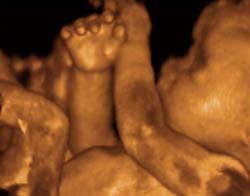Texas state legislators are defending an ultrasound bill in court that allows women a chance to see an ultrasound of their baby before an abortion. The bill is the subject of a lawsuit seeking to topple it.
Governor Rick Perry recently signed the measure into law that allows women to see the ultrasound 24 hours before the abortion. Abortion centers typically do ultrasounds to estimate the age of the baby before the abortion but they don’t normally allow women a chance to see or explain to them in detail the development of their unborn child. When used in pregnancy centers offering abortion alternatives, approximately 80 percent of women change their mind about having an abortion.
 The Center for Reproductive Rights, a pro-abortion law firm based in New York City, filed the lawsuit against the new law in June and is seeking to have a judge issue a temporary restraining order so abortion businesses in the state don’t have to implement the law while the lawsuit moves forward. The measure is scheduled to go into effect September 1 and abortion businesses would be obligated to allow women a chance to see the ultrasound.
The Center for Reproductive Rights, a pro-abortion law firm based in New York City, filed the lawsuit against the new law in June and is seeking to have a judge issue a temporary restraining order so abortion businesses in the state don’t have to implement the law while the lawsuit moves forward. The measure is scheduled to go into effect September 1 and abortion businesses would be obligated to allow women a chance to see the ultrasound.
Today, on behalf of Texas Senator Dan Patrick and Texas Representative Sid Miller, Liberty Institute filed an amicus brief to defend HB 15. Senator Patrick and Representative Miller were the authors of HB 15 in the Texas Senate and Texas House of Representatives, respectively.
Liberty Institute argues that HB 15 is consistent with Supreme Court and only requires the disclosure of truthful and accurate information to allow women to make informed decisions regarding their pregnancies.
“For years, women have been shielded from relevant information about their unborn child and the abortion procedure by abortionists who make money off of these women’s decisions,” said Kelly Shackelford, president of the pro-life legal group. “This lawsuit seeks to ensure less information for women and is a sad attempt to continue the practice of blindfolding women who are considering abortion. Women should have a right to see the sonogram of their child.”
A federal court held a hearing on the law in July, but gave no indication of how it would rule.
“The sonogram brings Texas’ outdated informed consent laws into the 21st century by reflecting advances in sonogram technology and related fields,” said Sen. Patrick, a Houston Republican. “Women must be given complete information about their pregnancies before making a life-changing choice regarding abortion.”
Miller, a Stephenville Republican, added, “Just as doctor gives medically-relevant explanation of his or her patient’s condition before even a minor procedure, an abortion provider should offer such information to women seeking abortions. This law protects Texans and empowers women with the critical and important information they need before making such a life-altering decision.”
The pro-abortion legal firm filed the lawsuit in the U.S. District Court for the Western District of Texas in Austin, on behalf of Texas Medical Providers Performing Abortion Services, a plaintiff class of abortion practitioners and facilities The class is represented by plaintiffs Metropolitan Ob-Gyn, P.A., D/B/A Reproductive Services of San Antonio and Dr. Alan Braid, an abortion practitioner.
The Senate passed the bill on second reading on a 21-10 vote and all hostile, pro-abortion amendments by Sens. Wendy Davis, Jose Rodriguez, and Leticia Van de Putte were defeated. After the Texas Senate signed off on the legislation, the state House, on a 94-41 vote, voted to concur on the Senate changes to HB 15, the sonogram bill.
Katherine Cesinger, a spokeswoman for the governor, said Perry “was pleased to sign this important legislation, which bolsters our efforts to protect life by ensuring Texans are fully informed when considering such an important decision.”
Thanks to pro-life Governor Rick Perry making sonogram legislation an emergency item, the House and Senate made the bill a priority. When used in pregnancy centers, ultrasounds convince more than 80 percent of women considering an abortion to keep their baby or consider adoption.







